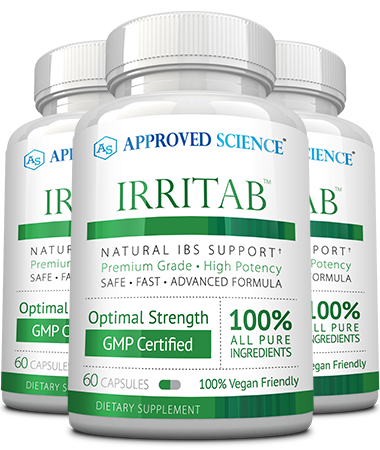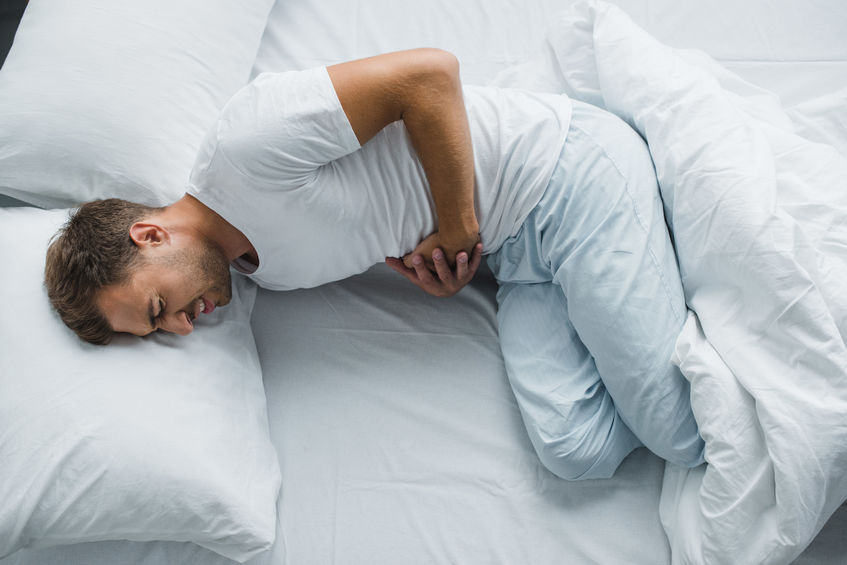Living with Irritable Bowel Syndrome is no easy feat, and with everything going on in the world today, your symptoms may be at an all-time high. Stress and anxiety are known to worsen IBS symptoms and with being in quarantine, stress eating may also be adding to the problem. While there is no specific treatment designed to cure IBS, a few home remedies and changes to your lifestyle can help you manage the debilitating symptoms.
Take A Load Off
It may sound easier said than done but practicing how to calm your mind and destress your body is a powerful tool for controlling IBS symptoms. There are so many responses that your body copes with when stress and anxiety levels start to rise, and these responses usually wreak havoc on your stomach. Hormones fluctuate and blood sugar levels rise, all of which affect the natural balance of bacteria in the gut. The healthy bacteria we need to maintain bowel movement and functions can be compromised and affected by harmful microbes lurking behind the protective lining in our gastrointestinal system.
When you feel a panic attack coming on or are just more stressed than usual, using a variety of relaxation techniques can help get the situation under control quickly.
According to the International Foundation For Gastrointestinal Disorders (IFFGD), these are a few techniques you can practice at home:
- Progressive muscle relaxation
- Abdominal deep breathing
- Focusing on imagery that is positive
Smart Supplements

With no medicinal treatment in sight for gastrointestinal disorders like IBS, innovative researchers and scientists have turned to mother nature to help address symptoms and help make life more manageable with IBS. All things lead to nutrition after all. There are thousands of IBS sufferers that have sought relief through the use of convenient nutritional aids to help keep symptoms like bloating, gas, inflammation, and irregular bowel movements at bay.
Natural IBS supplements contain various ingredients as well as live cultures and enzymes to help improve digestion and provide the body with additional soluble fiber to make it easier to pass stools. Incorporating a supplement like Irritab™ by Approved Science with these lifestyle and diet tips can effectively help soothe and reduce the severity of future IBS bouts.
Re-Lax
One of the most common symptoms of IBS is constipation and many over the counter brands offer laxatives to counteract this. Some may provide temporary relief, however, depending on your health status and the severity of your condition, these commercial laxatives can aggravate symptoms by triggering additional bloating, gas, and stomach pains. Instead of reaching for these OTC medications, there are many foods that can help alleviate constipation without the side effects including:
- Prunes
- Pears
- Leafy green vegetables
- Chia seeds
- Flax seeds
- Figs
- Apples
- Jerusalem artichoke
- Sweet potato
On the other hand, you may be experiencing frequent bouts of diarrhea instead. There are also many OTC antidiarrheal medicines that claim to alleviate diarrhea, however, these can also lead to side effects or worsened symptoms. Just like constipation, mother nature has you covered in this department with foods such as:
- Bananas
- Whole wheat toast or bread
- Rolled oats
- Boiled potatoes
- Soup broth
Get Moving
Working out every day helps to shoot two birds with one stone by reducing both your stress levels and bowel problems. Simple exercises like walking, jogging, sit-ups, and swimming help the muscles and intestines to contract, making it easier to pass any stools that may be causing a blockage. Practicing yoga is also an effective tried and tested way to help soothe an irritated gut and calm the nervous system with gentle movements. If you feel an IBS bout coming on, these are the poses you want to start with:
- The gate pose (Parighasana)
- The half-seated spinal twist (Ardha Matsyendrasana)
- The reclining abdominal twist (Jathara Parivritti)
- The supported bridge pose (Salamba Setu Bandhasana)
Take A Tea Break

When pain strikes, try sitting back and enjoying a cup of peppermint tea. Peppermint has shown to alleviate stomach cramps, bloating, and flatulence. The unique compound found in peppermint oil called L-menthol soothes the GI tract by inhibiting ion channels like calcium in the muscles, which reduces spasms and contractions in the intestines and gut. If you are a bit skeptical about using peppermint oil, there are various peppermint teas on the market that contain peppermint oil in safe doses.
Heat Things Up
Applying heat to your belly can help reduce spasms and inflammation you may be experiencing. According to research, applying continuous heat during IBS bouts can significantly reduce discomfort. In addition to that, applying heat has a physiological effect, which researchers also suggest is effective for calming the nervous system and providing relief from pain.
After making your peppermint tea, find a comfortable spot, and place a heating pad, hot water bottle, or topical heat rub on your abdomen. Always make sure you apply the pad or water bottle over a towel or your clothing to prevent burning yourself.
Choose H20
Water should always be your first drink of choice especially if you suffer from frequent bouts of IBS. water is essential for maintaining regular bowel movements because it helps to soften the stool allowing it to pass through the colon without causing any blockages. Drinking lots of fluids is also extremely important if you have diarrhea. When you are losing more fluids and electrolytes than you are taking in when you have diarrhea it often causes dehydration, which can be a serious medical problem if it is not addressed quickly. Dehydration not only causes more diarrhea, but it also causes dizziness, fatigue, fainting, and headaches. In addition to keeping dehydration at bay, other beverages such as sodas, milk, alcohol, and coffee could aggravate your IBS symptoms even further.
Tweak Your Fiber
Fiber can either be a blessing for some and for others it could spell..or smell disaster. High fiber foods such as vegetables and fruits can help with keeping bowel movements consistent and regular, but it all depends on you as an individual. You need to find the amount or type of fiber that suits you and your system. Every time you eat a fibrous food, jot it down in a food journal and keep a record of whether or not it affected your gut in any way. By doing this over several weeks with different fruits and vegetables, it will help give you a clearer idea of what is or is not working for you. If a high fiber diet is completely out of the question, your doctor may recommend supplementing with fiber tablets instead of dietary fiber.
Find A Support Network
IBS is a painful and often embarrassing disorder that can get in the way of life. Together with the discomfort and pain, IBS can also cause anxiety for some, especially if the people around you don’t really understand the situation. Getting involved in a support network focused on living with IBS can help take some of the burden and anxiety off of your shoulders. There are thousands of people out there who are also facing the same problems you are who you can reach out to and confide in. There is strength in numbers and by working through the tough times together, things do get easier.

